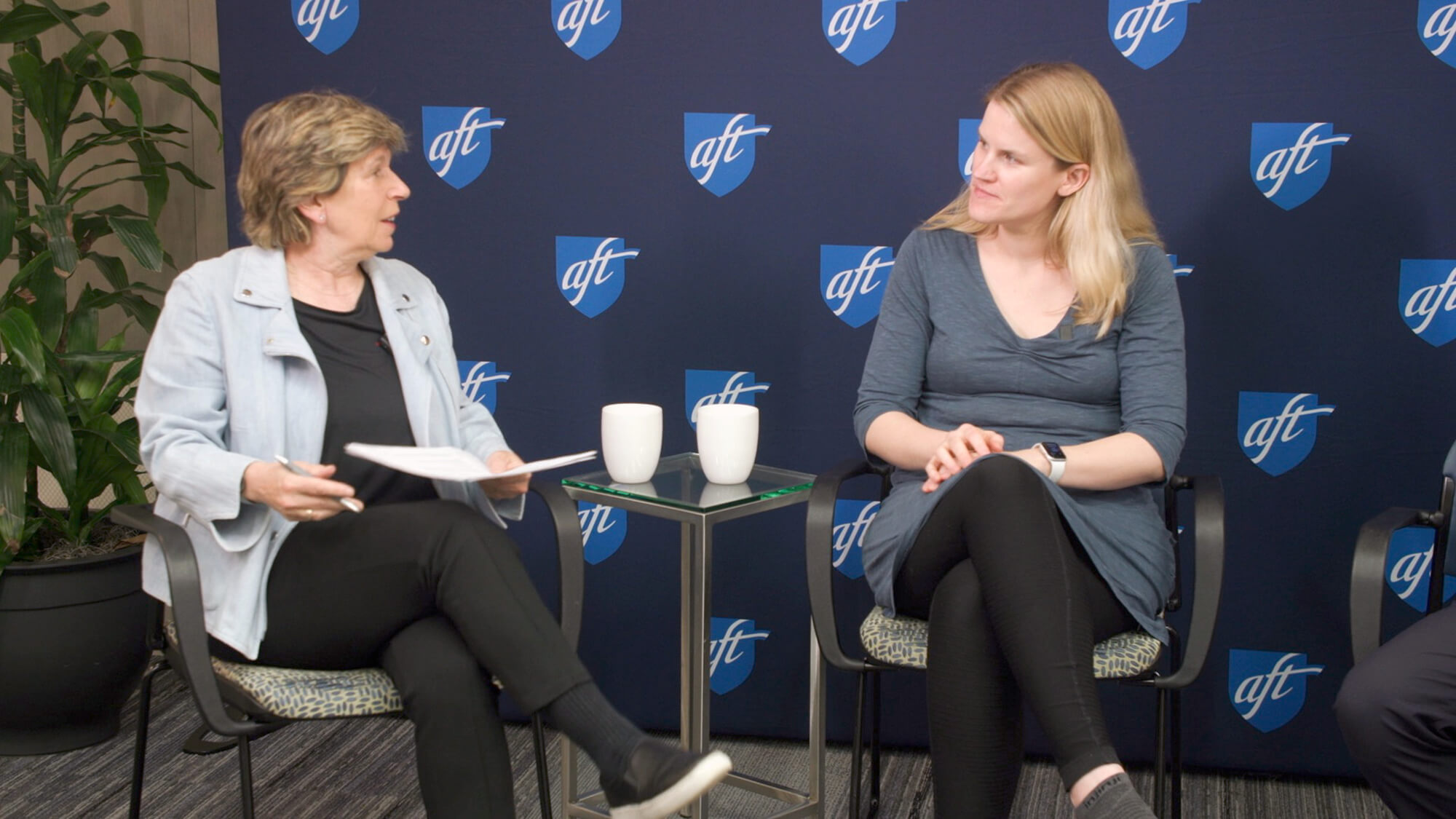America’s Silent Epidemic
School staff often are first responders to students’ mental health needs.

Weingarten, left, with Frances Haugen, an advocate for accountability in social media, May 3.
Alexandra Hinkson-Dutrevil was teaching a history lesson to her fourth-grade class when a student suddenly burst into tears. Between sobs, he said that his young cousin had COVID-19 and was on a ventilator, and he was afraid his cousin was going to die. Hinkson-Dutrevil could have talked to the student alone or referred him to another staff member so she could continue her lesson. Instead, she invited all her students to discuss their emotions, knowing that, especially during the pandemic, she “shouldn’t dismiss anything for the sake of fulfilling a lesson plan.” The floodgates opened.
Teachers’ daily lesson plans sometimes have to take a back seat to students’ immediate needs—whether physical, social or emotional. Every day, teachers and school staff help young people cope with trauma caused by the pandemic, as well as common banes of childhood like bullying and the increasingly toxic effects of social media.
May is Mental Health Awareness Month, an important opportunity to shine a light on the “silent pandemic” in our country—the mental health crisis. As a teacher, I know that school staff often are first responders to students’ mental health needs, despite most not being trained to provide such specialized support.
We need more school counselors, social workers, psychologists and nurses to support kids’ well-being. We must also expand community schools, which wrap services around schools and make them community hubs to better meet a full range of students’ and families’ needs. President Joe Biden’s fiscal year 2023 budget includes significant funding increases for these priorities.
And we must help the helpers. Educators are experiencing severe stress and burnout due to the pandemic, staffing shortages, increasing attacks on teachers, and efforts to mire schools in political and culture wars.
Even before COVID-19 swept the globe, many young people were suffering from poor mental health. One in 5 adolescents suffered a mental health condition. Suicide was, and still is, the second-leading cause of death among 10- to 24-year-olds. Last December, U.S. Surgeon General Vivek Murthy issued a rare public health advisory highlighting the urgent need to address the worsening mental health crisis affecting young people—from the millions who experienced deep loneliness and anxiety during the pandemic to the 200,000 children in the United States who have lost a parent or caregiver to COVID-19.
Concern for kids’ well-being—physical, emotional, social and academic—is the reason that, just weeks after the first pandemic lockdowns, the AFT started planning how to return to in-person learning safely. We know that remote and hybrid schooling are not adequate substitutes for learning in person. Teachers have worked tirelessly to keep students engaged, and a recent NPR/Ipsos poll found that 88 percent of parents believe their “child’s teacher(s) have done the best they could, given the circumstances around the pandemic.”
We know kids’ online activity wasn’t restricted to learning during school closures. For many, it was the only way to connect with their peers. But social media can be like a mirror that reflects one’s insecurities and anxieties.
Many tech executives limit and even prohibit their own children’s online activity. They are well-versed in the research about the harms of social media—including negative effects on self-esteem and self-image, and increases in anxiety, loneliness and depression. Facebook’s own internal research found that 13.5 percent of teen girls say Instagram worsens their suicidal thoughts and 17 percent say that Instagram contributes to their eating disorders.
In light of these troubling trends, the AFT has teamed up with Frances Haugen to support youth mental health and safe social media use. Haugen is a former Facebook product manager who ripped back the curtain to reveal how Facebook’s platforms hurt children, stoke division and threaten our democracy. She exposed how the company’s executives hide research about the social network’s risks because, as Haugen testified to Congress, “they have put their astronomical profits before people.”
In May, the AFT asked our union’s pension trustees to sanction Facebook’s parent company, Meta, citing evidence of the harmful effects Meta’s platforms have on children. We are also calling on Congress to enact legislation similar to the European Union’s Digital Services Act requiring social media companies to combat misinformation and divisive content.
The AFT has an array of programs to support the mental health of students and school staff, including a mental health benefit for AFT members, and training in social and emotional learning and trauma-informed education. Alexandra Hinkson-Dutrevil, the fourth-grade teacher whose student’s worries about his cousin sparked a classwide discussion, learned that strategy just weeks earlier at an AFT grief training program for teachers.
Our country faces many challenges. Improving mental health is not just one of them, it is essential to nurturing a healthy country that is equipped to meet all other challenges and opportunities. Creating safe and welcoming environments in every school is an important way to start.












